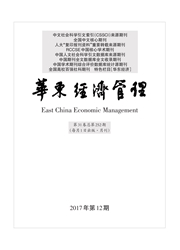

 中文摘要:
中文摘要:
文章基于2003-2014年中国制造业28个行业面板数据,运用超效率DEA模型评价其生态效率水平,并基于“波特假说”理论,构建计量回归模型检验环境规制对生态效率的影响。结果显示:中国制造业的生态效率总体呈递增态势,但长期处于低效率状态;环境规制对生态效率的影响存在滞后效应,短期内规制遵循的成本效应大于创新补偿效应,而且地方政府存在明显的策略性遵循行为;环境规制对生态效率的影响存在行业异质性,环境规制只促进了重度污染行业的生态效率,对中度和轻度污染行业具有抑制作用,“波特假说”仅在重度污染行业得到验证。最后,针对不同行业提出了对策建议。
 英文摘要:
英文摘要:
This paper evaluates the 28 sub-sectors of manufacturing eco-efficiency level by applying the SE-DEA model and analyzes the effect of environmental regulation on it (Porter hypothesis) by building the econometric regression model over the period of 2003 to 2014. The results show that: The eco-efficiency of Chinese manufacturing is increasing in general, but at the low value for a long time; There is the hysteresis effect of environmental regulation on eco-efficiency. In the short term, the cost effect of regulation is greater than the com- pensation effect of innovation, and the local government has an obvious strategic compliance; The effect of environmental regulation on eco-efficiency exists industry heterogeneity. It promotes the eco-efficiency of heavy polluting industries, but has the suppressing effect on moderate and light polluting industries, therefore, "Porter hypothesis" is only tested in the heavily polluting industry. Finally, we provide policy imolications for different industries.
 同期刊论文项目
同期刊论文项目
 同项目期刊论文
同项目期刊论文
 期刊信息
期刊信息
